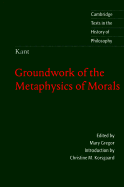Book contents
- Frontmatter
- Contents
- Introduction
- Chronology
- Further reading
- Groundwork of the Metaphysics of Morals
- Preface
- Section I Transition from common rational to philosophic moral cognition
- Section II Transition from popular moral philosophy to metaphysics of morals
- Section III Transition from metaphysics of morals to the critique of pure practical reason
- Notes
- Selected glossary
- Index
- Title in the series
Preface
- Frontmatter
- Contents
- Introduction
- Chronology
- Further reading
- Groundwork of the Metaphysics of Morals
- Preface
- Section I Transition from common rational to philosophic moral cognition
- Section II Transition from popular moral philosophy to metaphysics of morals
- Section III Transition from metaphysics of morals to the critique of pure practical reason
- Notes
- Selected glossary
- Index
- Title in the series
Summary
Ancient Greek philosophy was divided into three sciences: physics, ethics, and logic. This division is perfectly suitable to the nature of the subject and there is no need to improve upon it except, perhaps, to add its principle, partly so as to insure its completeness and partly so as to be able to determine correctly the necessary subdivisions.
All rational cognition is either material and concerned with some object, or formal and occupied only with the form of the understanding and of reason itself and with the universal rules of thinking in general, without distinction of objects. Formal philosophy is called logic, whereas material philosophy, which has to do with determinate objects and the laws to which they are subject, is in turn divided into two. For these laws are either laws of nature or laws of freedom. The science of the first is called physics, that of the other is ethics; the former is also called the doctrine of nature, the latter the doctrine of morals.
Logic can have no empirical part, that is, no part in which the universal and necessary laws of thinking would rest on grounds taken from experience; for in that case it would not be logic, that is, a canon for the understanding or for reason, which holds for all thinking and which must be demonstrated.
- Type
- Chapter
- Information
- Kant: Groundwork of the Metaphysics of Morals , pp. 1 - 6Publisher: Cambridge University PressPrint publication year: 1998

